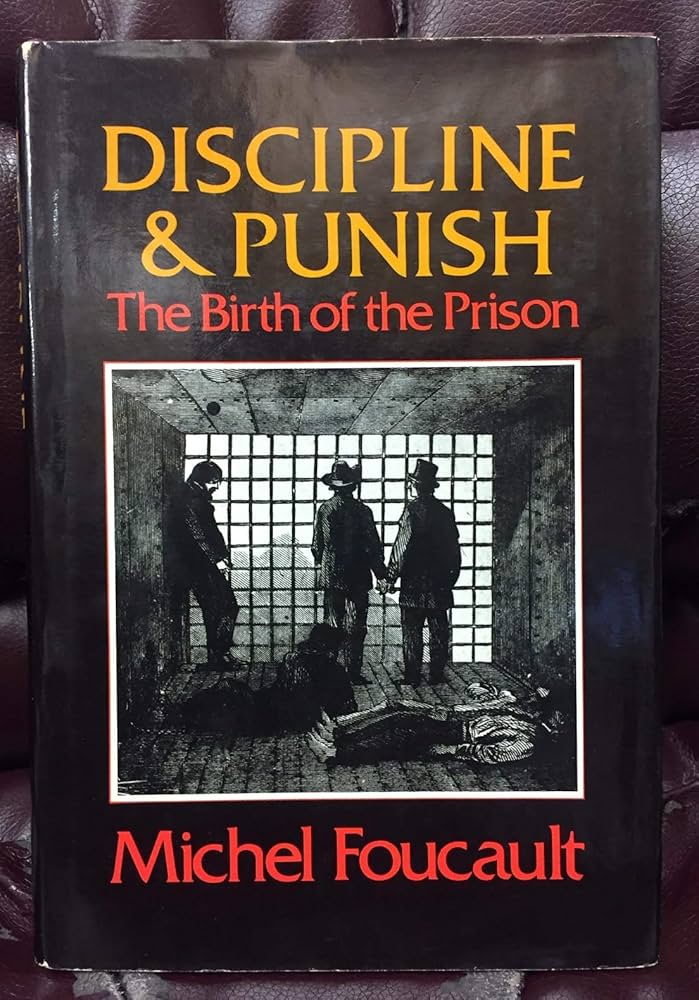Table of Contents
The Politics of the Body
First published in 1975, Discipline and Punish marks Michel Foucault’s pivotal transition from archaeology to genealogy—tracing not only how institutions record knowledge, but how they shape bodies, habits, and minds. The book interrogates the modern penal system, not to expose isolated cruelty, but to reveal the dispersed microphysics of power underpinning surveillance, discipline, and reform.
Foucault’s thesis is clear: we have not become more humane; we have simply refined domination. Punishment has moved from the body to the soul, from torture to normalization, from spectacle to invisible control.
Core Themes: Surveillance, Normalization, and the Soul as Prison
From Torture to Discipline
Foucault opens with the brutal execution of Damiens the regicide—a public, theatrical punishment meant to awe and terrify. He contrasts this with the modern prison’s silent, regulated routine. This shift, he argues, is not progress but transformation: discipline replaces pain as the medium of power.
Justice becomes a technique of individualization, operating not just on actions but on identities.
The Panopticon as a Diagram of Power
Bentham’s Panopticon—a circular prison where a central observer can watch all inmates without being seen—is for Foucault not just a structure, but a schema. It models the new mode of power: visibility without reciprocity, surveillance internalized.
Disciplinary power does not destroy; it produces: docile bodies, normalized behavior, predictable routines. This is the essence of bio-power—control through optimization.
The Birth of the “Delinquent”
Whereas the old penal system punished crime, the new one manufactures criminality. The prison is not a failure to reform—it is a success at producing subjects that justify its existence.
Foucault reveals how psychology, criminology, and education participate in a regime that defines, diagnoses, and disciplines the “abnormal.”
Historical Context: Genealogy and the Enlightenment
Foucault’s method is genealogical—uncovering how historical processes sediment into present norms. He challenges Enlightenment liberalism’s claim to rational, humanitarian justice, showing how disciplinary institutions multiply in the very name of freedom.
The school, the hospital, the barracks, the factory, the prison: all are nodes in a disciplinary network that reorganizes life through time-tables, examinations, and surveillance.
The result is governmentality—a diffuse control that operates not only on bodies but on populations and statistical patterns.
Legacy: Institutions and the Subject
Discipline and Punish fundamentally reshaped the study of:
- Power (non-sovereign, relational, productive)
- The body (as a site of inscription and docility)
- Institutions (as apparatuses of control)
- Subjectivity (as the product, not the precondition, of power)
Its impact spans disciplines: sociology, criminology, political theory, education, architecture. It anticipates our contemporary reality of algorithmic governance, predictive policing, and self-monitoring social media.
Strengths and Limitations
Strengths:
- A radically original framework for understanding modern institutions
- Conceptual clarity on surveillance and normalization
- Deep historical grounding and vivid illustrations
Limitations:
- Emphasis on domination may eclipse possibilities for agency or resistance
- Dense prose and non-linear structure may challenge some readers
- Focused mainly on Western penal systems—less on global or racialized dimensions
Who Should Read It?
- Students of philosophy, sociology, political science, and law
- Educators or designers of institutional systems
- Readers exploring the mechanics of surveillance and normalization
- Anyone wanting to understand the deep logic of modern power
TL;DR
Foucault’s thesis that power is productive, not just repressive, remains one of the most profound interventions in modern thought. Discipline and Punish doesn’t just describe how prisons work—it shows how discipline works everywhere, structuring schools, offices, hospitals, and digital networks. Its insights into the internalization of control are more relevant now than ever.
This is not merely a book about incarceration; it is a philosophical x-ray of how modern society disciplines without chains.

Leave a Reply